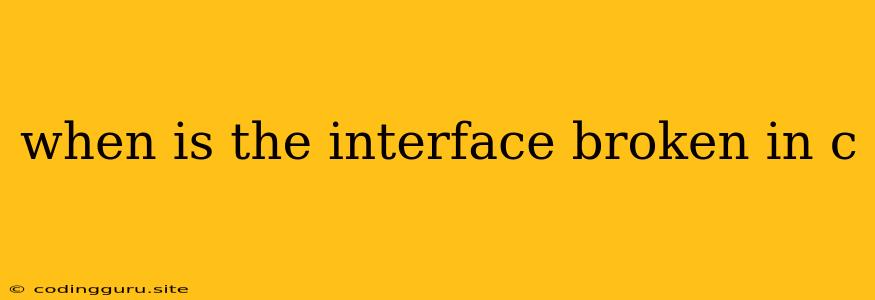Understanding When Interfaces Break in C
In the world of C programming, interfaces are the contracts between different parts of your code. They define how different modules interact with each other, ensuring that each part can function correctly even if it doesn't know the implementation details of the other. But what happens when these interfaces break?
What is an interface?
In the context of C, an interface is a set of functions declared in a header file. These function declarations specify the name, return type, and parameters of each function, but they don't provide the actual implementation. The implementation is provided in a separate source file, which is compiled into a library that can be linked with other code.
Why do interfaces break?
Interfaces can break for a variety of reasons. Here are some common culprits:
- Changes to function signatures: If you change the name, return type, or parameters of a function in the header file, any code that depends on the old signature will break.
- Changes to data structures: If you change the structure of a data type used by the interface, code that relies on the old structure will also break.
- Compiler or environment differences: Sometimes, code that compiles fine on one system might not work on another due to differences in compiler versions, libraries, or system architectures.
- Accidental modifications: Even a small typo in the code can change the way a function works, potentially breaking the interface.
How can you tell if an interface is broken?
The first sign of a broken interface is usually a compilation error. The compiler will try to link the different parts of your code together, and if the interfaces don't match, it will report an error.
Other symptoms of a broken interface include:
- Unexpected behavior: Your program might crash, produce incorrect results, or behave in ways that were not intended.
- Runtime errors: These are errors that occur when the program is running, such as segfaults, memory leaks, or crashes.
How to prevent interfaces from breaking
Here are some tips to prevent interfaces from breaking in C:
- Thorough documentation: Document the interface clearly and concisely, explaining what each function does, what parameters it takes, and what return values it produces.
- Version control: Use a version control system to track changes to your code. This will help you identify when an interface was broken and make it easier to revert to a previous version.
- Testing: Write comprehensive unit tests to verify that your interface is working correctly. Run these tests frequently to catch any changes that might break the interface.
- Use a style guide: Adopt a consistent coding style to reduce the chances of introducing errors that break interfaces.
- Maintain backward compatibility: Try to avoid making changes to the interface that would break existing code. If you must make changes, provide a clear migration path for users to update their code.
Example: Modifying a function signature
// interface.h
int calculate_sum(int a, int b);
// implementation.c
int calculate_sum(int a, int b) {
return a + b;
}
// main.c
int main() {
int sum = calculate_sum(2, 3);
printf("The sum is: %d\n", sum);
return 0;
}
This code defines a simple interface with a calculate_sum function. Let's say we decide to change the function to accept a third parameter. The new interface would look like this:
// interface.h
int calculate_sum(int a, int b, int c);
Now, if we compile main.c with this updated interface.h, we will get a compilation error because the function call in main.c is trying to pass only two arguments, while the function now requires three. This is an example of how a broken interface can lead to compilation errors.
Conclusion
Interfaces are crucial to building well-structured C programs. Understanding how interfaces work and how to prevent them from breaking is essential for writing reliable and maintainable code. By following the tips outlined above, you can ensure that your interfaces remain robust and that your code is well-organized and easily adaptable.
